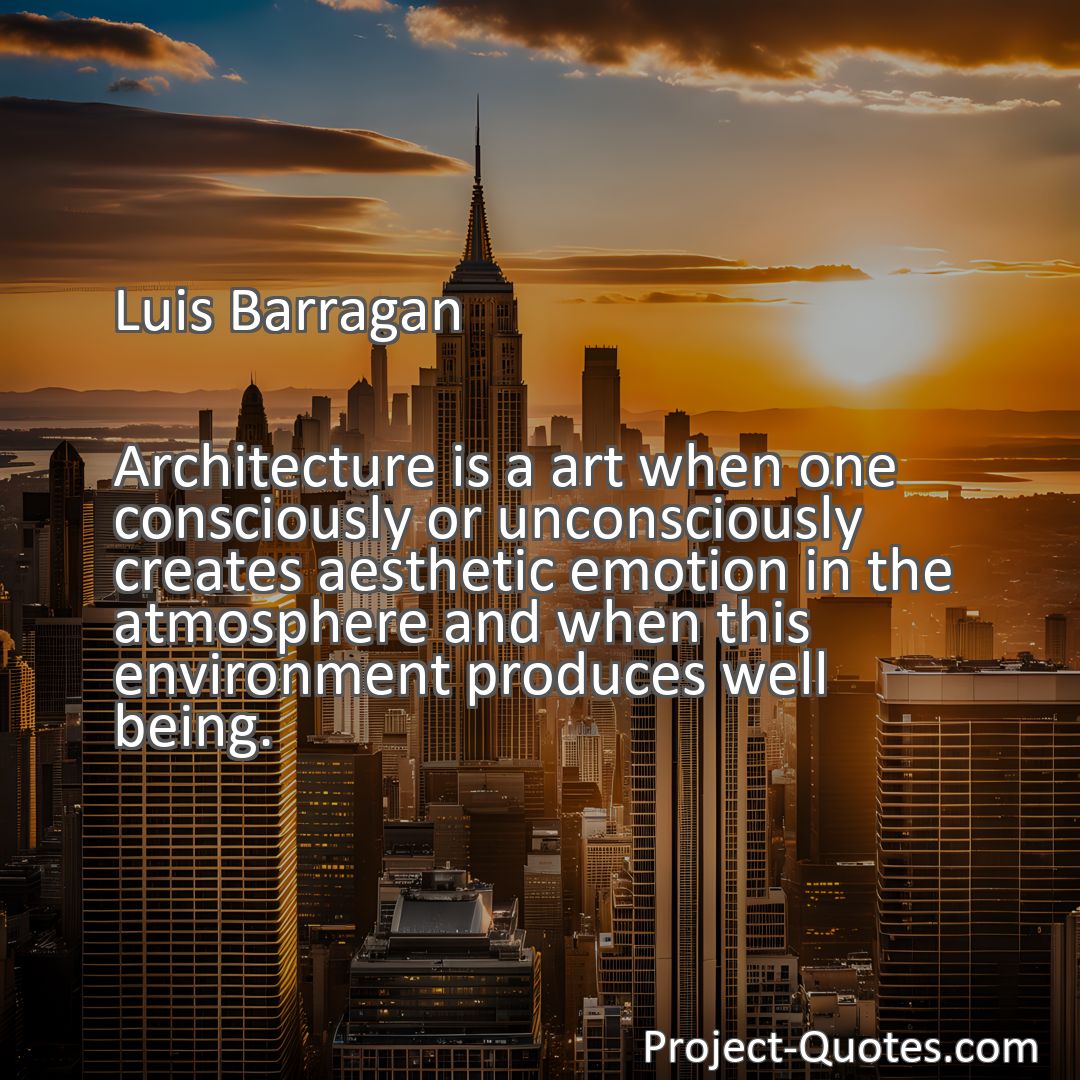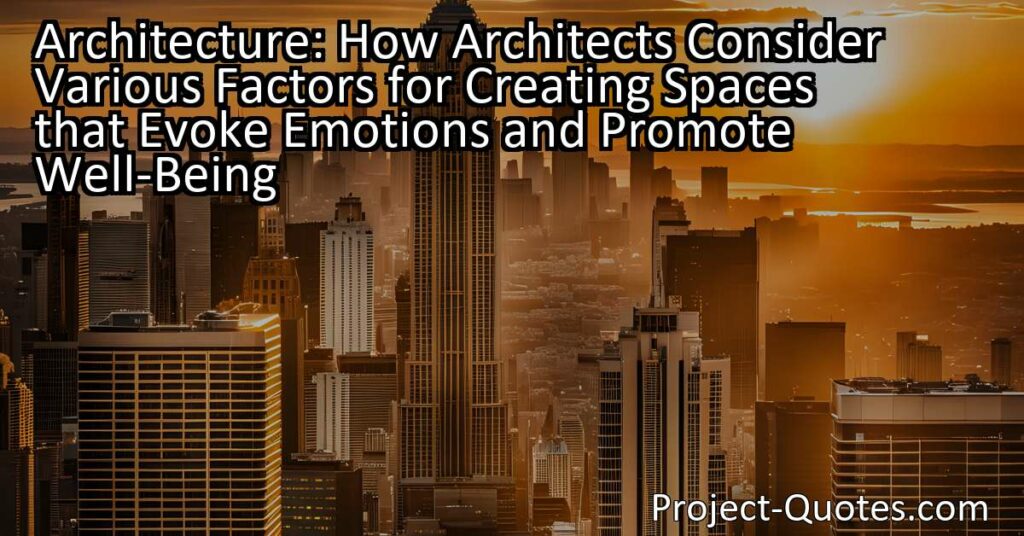Architecture is a art when one consciously or unconsciously creates aesthetic emotion in the atmosphere and when this environment produces well being.
Luis Barragan
Architecture: How Architects Consider Various Factors for Creating Spaces that Evoke Emotions and Promote Well-Being Architects use space, materials, and light to create visually pleasing buildings that can evoke emotions and positively impact our well-being. By considering factors such as functionality, accessibility, and aesthetics, architects strive to design spaces that promote well-being, whether it’s a school that encourages learning and creativity or a hospital that prioritizes a calming and healing atmosphere.
Table of Contents
- 1 Architecture is a art when one consciously or unconsciously creates aesthetic emotion in the atmosphere and when this environment produces well being.
- 2 Luis Barragan
- 3 Meaning of Quote – Architecture is a art when one consciously or unconsciously creates aesthetic emotion in the atmosphere and when this environment produces well being.
- 4 Freely Shareable Quote Image
- 5 Related
Meaning of Quote – Architecture is a art when one consciously or unconsciously creates aesthetic emotion in the atmosphere and when this environment produces well being.
Have you ever looked at a beautifully designed building and felt a sense of awe and wonder? Maybe you were captivated by the intricate details, the play of light and shadows, or the harmony of colors. If so, then you have experienced the incredible power of architecture as an art form.
Luis Barragan, a renowned Mexican architect, once said, “Architecture is an art when one consciously or unconsciously creates aesthetic emotion in the atmosphere and when this environment produces well-being.” In this quote, Barragan captures the essence of what makes architecture so special – its ability to elicit emotional responses and its potential to positively impact our lives.
When we think of art, we often imagine beautiful paintings or sculptures. However, art can take many forms, and architecture is undoubtedly one of them. Like a painter or sculptor, an architect carefully crafts their creation, but instead of using paint or clay, they use space, materials, and light to bring their vision to life.
Architecture has the power to transform our surroundings and create an atmosphere that evokes emotions within us. Have you ever walked into a cathedral and instantly felt a sense of serenity and tranquility wash over you? Or maybe you’ve visited a modern art museum with its sleek lines and open spaces, leaving you feeling inspired and invigorated. These are all examples of how architecture can generate aesthetic emotions within us.
But it’s not just about creating a visually pleasing space. Barragan emphasizes that architecture becomes an art when it also contributes to our well-being. Have you ever noticed how certain spaces make you feel comfortable and at ease, while others make you feel tense or uncomfortable? That’s because the design of a space can have a profound impact on our emotions and overall well-being.
Think about a cozy, well-lit living room with comfortable furniture. If you were to spend time in such a space, you would likely feel relaxed and at home. On the other hand, imagine a cramped, poorly lit room with clutter scattered everywhere. It’s easy to see how such an environment could make you feel anxious and unsettled.
The layout and design of a building can greatly influence our mood, productivity, and overall quality of life. This is especially important when it comes to public spaces such as schools, hospitals, and community centers. An architect must consider various factors such as functionality, accessibility, and aesthetics to create a space that promotes well-being for its users.
For example, a school should be designed in a way that encourages learning and creativity. Natural light, open spaces, and interactive elements can all contribute to a positive learning environment. Similarly, a hospital should prioritize a calming and healing atmosphere for patients and their families. Soft colors, quiet spaces, and access to natural views can all play a role in promoting wellness.
It’s fascinating to think about how architecture can have such a profound impact on our lives. Whether we realize it or not, the spaces we inhabit on a daily basis shape our experiences and emotions. From our homes to our workplaces to the public places we visit, architecture surrounds us and influences us in countless ways.
What’s even more incredible is that architecture has the power to transcend time and culture. Think about iconic buildings such as the Taj Mahal or the Great Pyramids of Giza. These structures were built centuries ago, yet they continue to evoke awe and admiration in people from all walks of life. They remind us of the enduring power of architecture to inspire and connect us.
As we navigate through our modern world, it’s important to recognize and appreciate the artistry of architecture. Take a moment to observe the buildings around you. Notice their design, their details, and the feelings they evoke within you. You might be surprised at how much beauty and inspiration can be found in the structures that surround us every day.
In conclusion, Luis Barragan’s quote beautifully captures the essence of architecture as an art form. It reminds us that architecture has the ability to create aesthetic emotions and contribute to our well-being. From the emotions evoked by a beautifully designed space to the impact of architecture on our moods and overall quality of life, there is no denying the importance of this art form. So let us appreciate and celebrate the architects who enrich our lives with their creations, and may we always find inspiration and well-being in the spaces they create.
I hope this quote inspired image brings you hope and peace. Share it with someone who needs it today!


